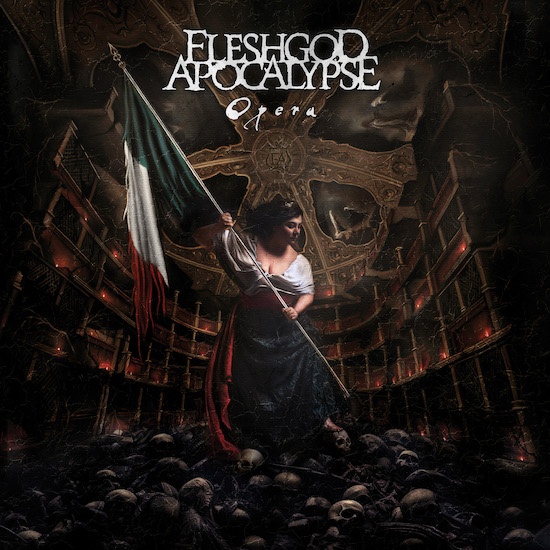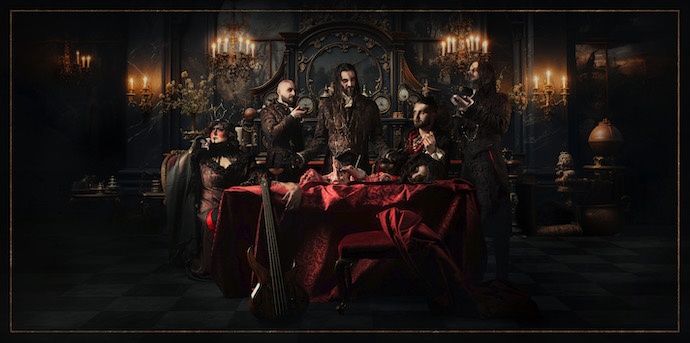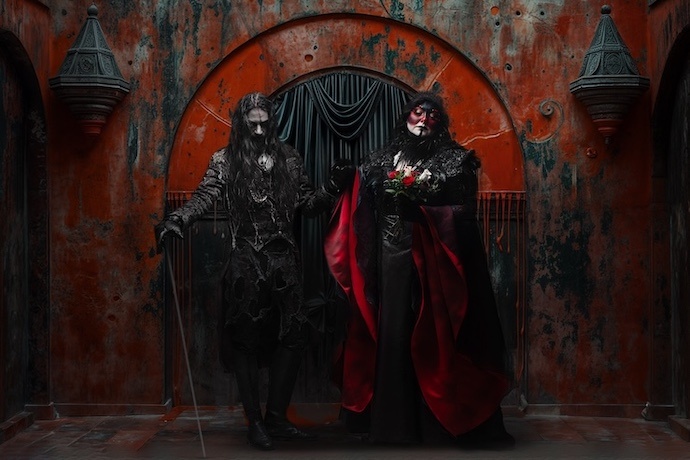
(DGR wrote the following review of the new album by Italy’s Fleshgod Apocalypse, which will be released this Friday, August 23rd, by Nuclear Blast Records.)
Given that Fleshgod Apocalypse have up to this point had a seventeen-year career and now six albums to their name, it’s surprising that the group have never had a straightforward self-titled release.
Often used as either the initial opening statement of a group’s career – the proverbial flag in the ground of “this is who we are as a band” – or, having become more frequent, a later-in-the-career platform for either reinvention or just outright reminder that they in fact still exist and are going strong, the self-titled does have a surprising amount of cultural cachet to it.
If you were to view the self-titled as the platform for reinvention, often the resurrection of a group or the crystalizing of a particular lineup, now would be such a time for it in Fleshgod Apocalypse‘s career, with only two of the members from the early days of their career still standing and three others now full-time members of the lineup, with a few of them having held steady in a live-lineup status since the release prior to 2019’s Veleno, and one having been such an integral part of the band’s sound and stage show that it was surprising they hadn’t been upgraded sooner.

Considering how much of the band’s career and music have been built around the idea of symphonic bombast and just how much over the years they have pulled from more classical-leaning artforms, it is perfectly fitting that the band’s newest album is entitled Opera. Fleshgod Apocalypse have made a name for themselves as beings larger than life with music to match, often making the idea of delusions of grandeur look like child’s play, so why not then would a band pick a form of stage performance and writing that often requires its singers and actors to be larger than life?
Fleshgod Apocalypse have been drawing comparisons to it for years. In lieu of an actual self-titled up to this point, one could argue then that an album bearing the name of a musical style that has often been interwoven within the group’s musical DNA might as well be close enough, thus we arrive at the doorstep of Fleshgod Apocalypse‘s newest album Opera.
Opera is meant to be a concept album, with a thematic throughline tying the whole release together. Much of Opera is inspired by events that happened to the band’s multi-instrumental mainman Francesco Paoli and his rock-climbing accident, which left him with severe injuries and an extended hospital stay. As you would expect, much of this has been amplified to the Nth degree and the characters tumbling through the album’s thematic throughlines become sworn to vengeance, often making massive declarations and finding themselves taunted by beings far beyond their reach.
Up to this point, attempting to scry the future of where Fleshgod Apocalypse might’ve been heading was proving to be a fool’s errand, as they spent much of the pandemic lockdown effectively losing their musical minds, resulting in a Children Of Bodom-esque goofball cover song – played remarkably straight, actually – and some late ’90s pop throwback in the musical schizophrenia that was the single “No”.
2019’s Veleno was an oddly paced album with a smorgasbord of ideas running through it. It made for a fantastic collection of varied singles but it played things fast and loose, experimenting with not only how the album opened – answer: suddenly – but also in how Fleshgod Apocalypse approached their music. Reeling a bit from some big lineup changes for the band, Veleno was the most musically varied Fleshgod Apocalypse had been up to that point, trading in the massive bombast, unrelenting speed, and sinister airs for the freedom to play around with the group’s sound.

Opera continues in that album’s stead, once again containing some of the most varied and out-of-nowhere surprising music that Fleshgod Apocalypse have recorded yet. Opera pulls from a wide region of musical landscapes, often places singer – and no longer secret weapon – Veronica Bordacchini at the forefront, and then wraps much of it around the expected high-speed ass kicking you would expect from the Fleshgod Apocalypse name. The more surprising part is there is a second spectre in play when it comes to Opera, and that is that some of the heaviest moments within the album bear a striking resemblance to an earlier predecessor in 2016’s King.
It can’t be overstated just how much King solidified the band into what we know as Fleshgod Apocalypse now. If you were to view the three albums prior as being the steady increase in both spectacle and velocity, then King is the album wherein Fleshgod became modern-day Fleshgod and began attempting to do something other than run everything past their nominal tolerances in the name of blowing the listener’s hair back. King even locked in place particular patterns for the band, including placing the usual and expected over-the-top asskicker ‘long about track three or four of the album and then hiding another more unhinged one later on.
In Opera‘s case; that honor is given to previously released single “Bloodclock” with its high-speed hooks and massive choral backing steadily following – and iterating on – the melody created within the first few segments of the song. “Bloodclock” has the ability to pry into a listener’s skull and stay there for a long time with insidious efficiency.

The latter hidden bit of madness? That’s “Morphine Waltz“, part of a one-two pairing that we’re going to circle back around to later on in this review simply because the song following it is going to turn quite a few heads.
“At War With My Soul” is the song wherein Fleshgod Apocalypse raise spectres of the old, a big and burly number built around a chugging riff in the vein of “Pendulum” earlier on within Opera, “At War With My Soul” often feels like an unintended single following King‘s “Healing Through War”. It has a similar percussive and punchy vocal style, and likewise, with Opera swaying between fast-slow-fast-slow for its first handful of songs, “At War With My Soul” is positioned in such a way that it can call to mind some of the two-part spectacles Fleshgod have unleashed in the past.
“At War With My Soul” has a swaying nature, similar to how “Pendulum” swings back and forth between its main melody and heftier vocal passages, yet “At War With My Soul” – if somewhat unintentional given what the title implies – has a militaristic march to it that sees Fleshgod bashing their way through castle walls.
There’s maybe four people out there who will be shocked to hear that singer Veronica Bordacchini takes a prominent role within Opera this time around. Cast as the titular character, songs are often written in call-and-response format with Francesco and Veronica exchanging either verbal blows or answering each other’s musical inquiries.
She’s even at the forefront of a couple of songs this time around, in the back half of the album, and one in particular – which we’re now circling back to – may be the most straightfroward symphonic goth metal track Fleshgod Apocalypse have ever unleashed. Had Trail Of Tears not literally reunited and put out an EP a few months ago, we’d be lost in finding comparisons for it, but “Matricide 8.21” may be as close as Fleshgod have ever clawed their way to that.
It’s an incredibly bouncy and sing-songy style of song, built around a thumping bass line and a massive chorus-hook that vacillates between the band roaring – quite literally in some of the ways Franceso Paoli bursts into the song – their way at the end of chorus segment and the light jog of a guitar riff that the song is constructed around. Arriving right after “Morphine Waltz” seems to bounce off of its four padded walls for three and a half minutes, it makes the mid-section of Opera one hell of a head turner to say the least.
Many bands reach a point in their career when they become just as much spectacle as they do musical experience. In the case of Fleshgod Apocalypse, they had already started at that point, so ingrained in their identity as has been the “holy fuck you need to see this” nature of their music. They exist in being a grandiose caricature and Opera continues in that regard.
In some ways, Fleshgod Apocalypse have reined it in for Opera as the album does have its moments of sheer polarity: some of the heaviest and lightest moments of Fleshgod Apocalypse‘s career lie within its bounds. However, the experience has enough on offer to still be plenty enjoyable.
Fleshgod Apocalypse have enough of their standards within Opera to satiate their fanbase as well as enough wild expeirmentation to keep heads turned. They may scrape dangerously close to retreading ground they’ve covered before from time to time, but they never quite get there, instead offering up a release of spiritual musical sequels alongside new experiences, tied together by one grim overarching concept and a whole lot of background orchestration.
https://fga.bfan.link/opera
https://www.facebook.com/fleshgodapocalypse
https://www.instagram.com/fleshgodofficial/
